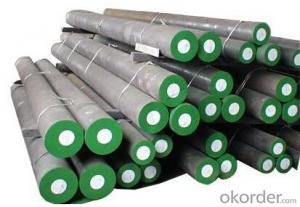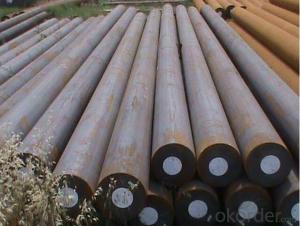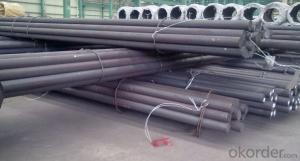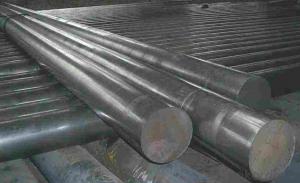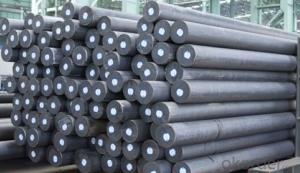Grade AISI5152 CNBM Alloy Special Steel Round Bar
- Loading Port:
- Shanghai
- Payment Terms:
- TT OR LC
- Min Order Qty:
- 30 m.t
- Supply Capability:
- 10000 m.t/month
OKorder Service Pledge
OKorder Financial Service
You Might Also Like
Item specifice
Specifications of Round Bar
Diameter: 4mm - 800mm
Length: Max 12m
Heat Treatment: Normalizing, Annealing, Tempering, Quenching
Chemical Composition and Mechanical Properties
Chemical Composition | Mechanical Properties(In Quenched & Tempered State) | ||
C | 0.17-0.23 | Tensile strength(MPA) | 930 |
Si | 0.17-0.37 | Yield strength (MPA) | 735 |
Mn | 0.90-1.20 | Elongation(δ5/%) | 10 |
Cr | 0.90-1.20 | Reduction in Area (ψ/%) | 45 |
Mo | 0.05 | Impact (J) | 47 |
P | ≤0.030 |
|
|
S | ≤0.030 |
|
|
V | --- | Hardness | 187HBW |
Our Featured Products
Alloy steel: Combination of steel / Bearing steel// Spring steel/ Cr- mo steel
GB 20Cr/ 40Cr / 42CrMo / 35CrMo/ 20CrMn/GCr15/30CrMnTi…
ASTM 5120 /5140 / 4140/ 4135/ 5152/52100…
JIS SCr420H/ SCr440/ SCM3/ SUP9/SUJ2…
Carbon steel: Carbon tool steel /Carbon Structural Steel
GB 20/ 35 /45/…
ASTM 1020/ 1030/1045…
JIS S20C/ S30C / S45C…
Usage and Applications of Round Bar
1. Chinese standard steel bar is often used where large amounts of steel need to be formed, for example as structural steel.
2. And we can use this kind of product on the performance of the mechanical parts if the demand is not very high.
3. Steel round bar is used in construction and a large number of architectural and engineering structures.
Packaging & Delivery of Round Bar
Packaging Detail: All goods are packed in bundle with steel strips and shipped by break bulk vessel or container (depend on target market and different ports)
Delivery Detail: 15~45 days
Trade terms: FOB, CFR, CIF
MOQ: 30 metric tons per specification; we can negotiate the quantity if the specification is normal or we have stock of one specification.
Weight: Theprice invoicing on theoretical weight basis or actual weight basis depends on customer’s request.
Shipment: The shipment of bulk break or container is depends on customer’s request and the situation of the port of destination.
Documents given: Full set of original clean on board bill of lading; Original signed commercial invoice; Original packing list; Policy of insurance; Certificate of origin and what the target market needs.
Production Flow of Round Bar
1. The common processes are preheated forging quenching, dual refinement solution process, cooling quenching and isothermal quenching. We use heat treatment for dual refinement solution process.
2. Material prepare (billet) — heat up — rough rolling — precision rolling — cooling — packing — storage and transportation
FAQ:
Q1: Why buy Materials & Equipment from OKorder.com?
A1: All products offered byOKorder.com are carefully selected from China's most reliable manufacturing enterprises. Through its ISO certifications, OKorder.com adheres to the highest standards and a commitment to supply chain safety and customer satisfaction.
Q2: How do we guarantee the quality of our products?
A2: We have established an advanced quality management system which conducts strict quality tests at every step, from raw materials to the final product. At the same time, we provide extensive follow-up service assurances as required.
Q3: How soon can we receive the product after purchase?
A3: Within three days of placing an order, we will begin production. The specific shipping date is dependent upon international and government factors, but is typically 7 to 10 workdays.
Q4: What makes stainless steel stainless?
A4: Stainless steel must contain at least 10.5 % chromium. It is this element that reacts with the oxygen in the air to form a complex chrome-oxide surface layer that is invisible but strong enough to prevent further oxygen from "staining" (rusting) the surface. Higher levels of chromium and the addition of other alloying elements such as nickel and molybdenum enhance this surface layer and improve the corrosion resistance of the stainless material.
Q5: Can stainless steel rust?
A5: Stainless does not "rust" as you think of regular steel rusting with a red oxide on the surface that flakes off. If you see red rust it is probably due to some iron particles that have contaminated the surface of the stainless steel and it is these iron particles that are rusting. Look at the source of the rusting and see if you can remove it from the surface.
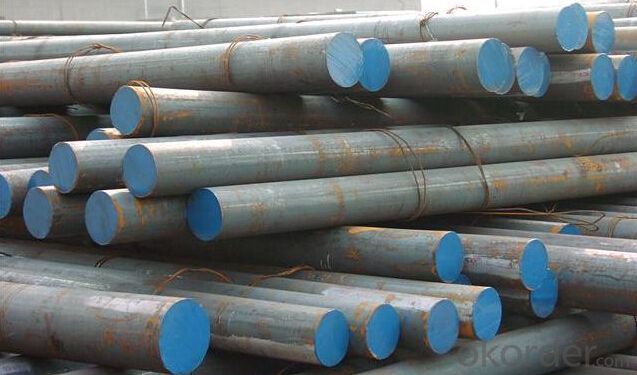
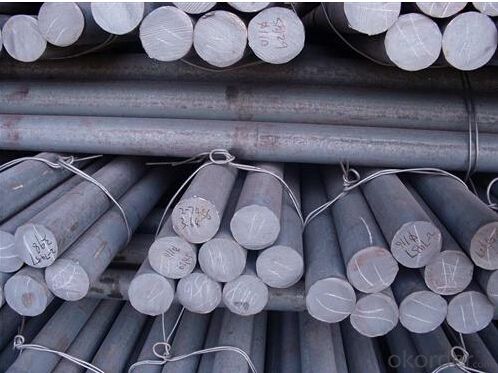
- Q:How does special steel perform in low-temperature environments?
- Special steel performs exceptionally well in low-temperature environments. It exhibits excellent toughness, high strength, and remarkable resistance to brittle fracture, which makes it suitable for various applications in extreme cold conditions. Additionally, special steel maintains its mechanical properties even at sub-zero temperatures, ensuring reliability and durability in challenging environments.
- Q:What are some innovative applications of special steel?
- Special steel, also known as alloy steel, offers a wide range of innovative applications due to its unique properties and characteristics. Some of these applications include: 1. Aerospace Industry: Special steel is extensively used in the aerospace industry for manufacturing critical components like turbine blades, landing gears, and structural parts. Its high strength, excellent corrosion resistance, and ability to withstand extreme temperatures make it an ideal choice for these applications. 2. Automotive Industry: Special steel finds various applications in the automotive industry, including the production of engine components, suspension systems, and safety-related parts. Its exceptional strength-to-weight ratio and resistance to wear and fatigue ensure improved performance, durability, and safety in vehicles. 3. Medical Devices: Special steel is utilized in the manufacturing of surgical instruments, implants, and medical equipment. Its biocompatibility, high strength, and resistance to corrosion make it suitable for use in implants such as artificial joints, stents, and dental implants. 4. Energy Sector: Special steel plays a crucial role in the energy sector, particularly in power plants, nuclear reactors, and oil and gas facilities. Special steel pipes and tubes are used for conveying fluids and gases, while its high-temperature resistance is essential for components like steam turbines and boilers. 5. Tooling and Machining: Special steel is extensively used in tooling and machining processes due to its exceptional hardness, toughness, and wear resistance. It is employed in the production of cutting tools, dies, molds, and machine components, ensuring high precision, extended tool life, and increased productivity. 6. Defense and Security: Special steel is used in the defense and security sectors for the production of armored vehicles, ballistic protection, and military-grade equipment. Its ability to withstand high impact and provide superior protection against projectiles and explosions make it an essential material in these applications. 7. Construction and Infrastructure: Special steel is widely used in the construction industry for applications such as bridges, high-rise buildings, and infrastructure projects. Its high tensile strength, resistance to corrosion, and durability ensure structural integrity and safety. 8. Renewable Energy: Special steel is employed in the renewable energy sector, particularly in wind turbines and solar energy systems. Its high strength and resistance to fatigue ensure the reliability and longevity of these energy generation systems. In conclusion, special steel offers numerous innovative applications across various industries due to its unique properties. From aerospace and automotive to medical devices and renewable energy, this versatile material continues to drive advancements and meet the evolving needs of modern technology and society.
- Q:What are the requirements for special steel used in cryogenic applications?
- Special steel used in cryogenic applications must meet several requirements to ensure its performance and reliability in extreme low-temperature environments. Firstly, the steel should have excellent low-temperature toughness to withstand the extreme cold. This means that it should be able to resist brittle fracture and maintain its mechanical properties even at cryogenic temperatures. The steel should have a high toughness and ductility to absorb impact and prevent cracking. Secondly, the steel must have a low coefficient of thermal expansion. This is important because cryogenic applications involve significant temperature changes, and a high coefficient of thermal expansion can lead to dimensional instability and stress within the material. A low coefficient of thermal expansion helps to minimize these effects and maintain dimensional stability. Thirdly, the steel should have a low thermal conductivity. Cryogenic applications often involve the transfer or storage of extremely cold substances, and a low thermal conductivity helps to prevent heat transfer and maintain the desired temperature. This is particularly important for applications where temperature control is critical, such as in the storage of liquefied gases. Additionally, the steel should have good corrosion resistance. Cryogenic environments can be highly corrosive, and the steel needs to be able to withstand the effects of any corrosive substances that may be present. This is particularly important for applications involving the storage or transportation of cryogenic liquids or gases. Finally, the steel should have good weldability. In many cryogenic applications, welding is required to join different components or sections of the steel. Therefore, the steel must have good weldability to ensure strong and reliable joints. In summary, the requirements for special steel used in cryogenic applications include excellent low-temperature toughness, low coefficient of thermal expansion, low thermal conductivity, good corrosion resistance, and good weldability. Meeting these requirements ensures that the steel can withstand the extreme cold and harsh conditions of cryogenic environments while maintaining its structural integrity and performance.
- Q:What are the applications of special steel in the aerospace sector?
- Special steel has various applications in the aerospace sector due to its exceptional properties. It is used for manufacturing critical components such as turbine blades, landing gear, and structural parts. The high strength, corrosion resistance, and heat resistance of special steel make it ideal for withstanding extreme conditions experienced during flight. Additionally, its lightweight nature contributes to fuel efficiency and overall performance improvement in aircraft.
- Q:How does maraging steel achieve high strength through aging?
- Maraging steel achieves high strength through aging by undergoing a process called precipitation hardening. This involves heating the steel to a specific temperature and holding it there for a certain period of time, followed by rapid cooling. This process allows the formation of fine, intermetallic particles within the steel's microstructure, which greatly enhances its strength. Additionally, the aging process helps relieve residual stresses and improves the steel's toughness and corrosion resistance.
- Q:What is the significance of alloying elements in special steel?
- Alloying elements play a crucial role in special steel as they enhance the mechanical properties, corrosion resistance, and overall performance of the steel. These elements are added in specific proportions to alter the microstructure and create desired properties such as increased strength, hardness, toughness, and heat resistance. Additionally, alloying elements can improve the steel's ability to withstand extreme conditions, such as high temperatures or corrosive environments. Overall, the presence of alloying elements in special steel allows for the production of tailor-made materials that meet specific application requirements in industries such as automotive, aerospace, and construction.
- Q:What are the applications of special steel in the oil and gas supply chain?
- Special steel has various applications in the oil and gas supply chain. It is commonly used in the construction of pipelines, offshore platforms, and drilling equipment due to its high strength, corrosion resistance, and ability to withstand extreme conditions. Special steel also finds its utility in the manufacturing of valves, fittings, and connectors, ensuring efficient and leak-free operations. Additionally, it is used in the production of storage tanks and vessels, providing reliability and safety in the containment of oil and gas. Overall, special steel plays a crucial role in enhancing the durability, performance, and safety of equipment and infrastructure within the oil and gas supply chain.
- Q:What is the significance of carbon content in special steel?
- The carbon content in special steel is significant because it determines the steel's hardness, strength, and overall performance. Higher carbon content results in increased hardness and strength, making the steel suitable for applications requiring durability and resistance to wear and tear. On the other hand, lower carbon content enhances the steel's ductility and formability, making it more suitable for shaping and molding processes. Therefore, carbon content plays a crucial role in tailoring the properties of special steel to meet specific industrial requirements.
- Q:How does the alloying elements affect the properties of special steel?
- Alloying elements have a significant impact on the properties of special steel. By adding specific elements in varying proportions, the strength, hardness, corrosion resistance, and other properties of the steel can be altered. For example, chromium increases the steel's resistance to corrosion, manganese improves its strength, and nickel enhances its toughness. Different combinations of alloying elements can create specialized steels with specific properties tailored for various applications in industries such as automotive, aerospace, and construction.
- Q:How is special steel used in the production of engine components?
- Special steel is used in the production of engine components due to its superior strength, durability, and heat resistance properties. It is commonly utilized to manufacture critical parts such as crankshafts, connecting rods, camshafts, valves, and piston rings. The high strength of special steel allows these engine components to withstand the extreme forces and temperatures experienced during engine operation, ensuring optimal performance and longevity of the engine.
1. Manufacturer Overview |
|
|---|---|
| Location | |
| Year Established | |
| Annual Output Value | |
| Main Markets | |
| Company Certifications | |
2. Manufacturer Certificates |
|
|---|---|
| a) Certification Name | |
| Range | |
| Reference | |
| Validity Period | |
3. Manufacturer Capability |
|
|---|---|
| a)Trade Capacity | |
| Nearest Port | |
| Export Percentage | |
| No.of Employees in Trade Department | |
| Language Spoken: | |
| b)Factory Information | |
| Factory Size: | |
| No. of Production Lines | |
| Contract Manufacturing | |
| Product Price Range | |
Send your message to us
Grade AISI5152 CNBM Alloy Special Steel Round Bar
- Loading Port:
- Shanghai
- Payment Terms:
- TT OR LC
- Min Order Qty:
- 30 m.t
- Supply Capability:
- 10000 m.t/month
OKorder Service Pledge
OKorder Financial Service
Similar products
New products
Hot products
Related keywords
